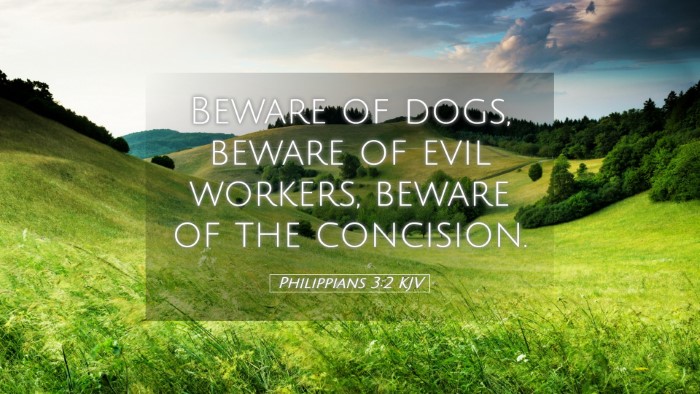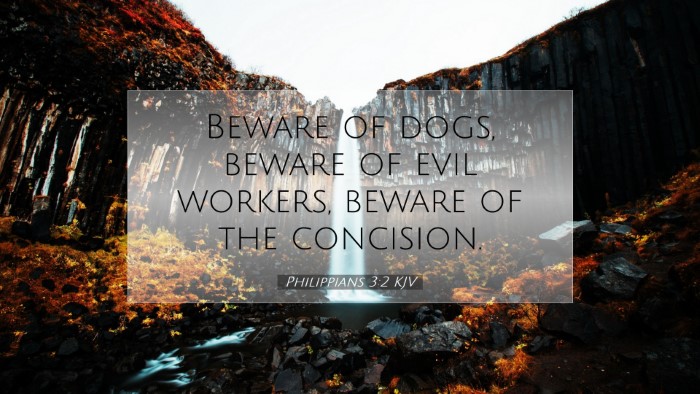Commentary on Philippians 3:2
Philippians 3:2 states: "Beware of dogs, beware of evil workers, beware of the concision." This verse expresses profound theological and practical concerns that deserve careful examination. The Apostle Paul, in this exhortation, embarks on a critical admonition to the Church at Philippi, warning them about false teachers and their deceptive practices.
Understanding the Context
To fully grasp the weight of this verse, we must consider its context within the epistle. Paul writes this letter while in imprisonment, yet his focus remains steadfast on the well-being and growth of the Philippian church. He rejoices in their partnership in the gospel and encourages them to stand firm in their faith. However, he introduces a serious caution regarding those who would distort the true gospel.
The Admonition: "Beware..."
This call to vigilance is critical for believers. Paul employs the term "beware" three times, underscoring the urgency and importance of the warning. Each repetition serves to reinforce the need for diligence against three specific dangers:
- Dogs: This term is used derogatorily to reference those who are of impure character—false teachers who would lead believers astray. In Jewish culture, dogs were considered unclean; thus, Paul’s use of this term depicts a stark image of the spiritual filth of false doctrine.
- Evil Workers: Paul categorizes certain individuals as evil workers, highlighting their misdeeds and harmful influence within the church. These individuals may appear righteous but are motivated by corrupt intentions and are involved in activities that distract from the purity of the gospel.
- The Concision: This refers to those who preach circumcision as a necessity for salvation, emphasizing a works-based righteousness that negates the grace of Christ. Paul vehemently opposes this, as it undermines the central tenet of salvation through faith.
Theological Implications
Each of these warnings carries significant theological weight. Paul recognizes that the integrity of the gospel message is paramount. The influence of false teaching not only jeopardizes personal faith but can also lead to communal disarray and the dilution of Christian doctrine.
Insights from Matthew Henry
Matthew Henry notes that dogs are labeled as such due to their vile nature and the unclean practices they represent. He emphasizes the importance of believers maintaining a distance from such characters, urging the church to pursue purity and holiness. His commentary points out the necessity of discernment, asserting that what may seem harmless can be laden with danger for the soul.
Albert Barnes' Perspective
According to Albert Barnes, the term "evil workers" emphasizes the subtleness of such deception; they often present themselves as pious yet engage in actions that undermine the core of Christian faith. Barnes encourages the faithful to be guarded against the allure of works-righteousness, reminding them that genuine faith stands contrary to human merit.
Adam Clarke's Examination
Adam Clarke delves into the term "concision." He explains it as a play on words, alluding to the Jewish practice of circumcision, flipping it to indicate those who would cut or divide the true gospel. Clarke stresses the gravity of the issue Paul addresses, noting that such teachings are not merely misguided but are fundamentally dangerous to the believer’s relationship with Christ.
Practical Application
For pastors and theologians, this verse serves as a reminder to safeguard doctrine within the church. Vigilance in preaching and teaching is necessary to protect the congregation from insidious falsehoods. As students of the Word, believers are called to engage critically with teachings and discern their alignment with the foundational truths of scripture.
Guarding Against False Teaching
- Knowledge of the Word: It is essential for believers to possess a thorough understanding of scripture. Just as Paul admonished the Philippians, modern Christians must immerse themselves in the teachings of the Bible to recognize deviations.
- Accountability within Community: The body of Christ should foster an environment of open dialogue and accountability. Leaders and congregants alike should share insights and concerns regarding teachings and practices within the church.
- Prayerful Discernment: The importance of prayer cannot be overstated. Seeking the guidance of the Holy Spirit in discerning truth from error aids in spiritual vigilance.
Conclusion
Philippians 3:2 serves as a sobering reminder of the realities faced by the early church, which continue to echo through time to present believers. The battle against false teaching is ongoing, requiring diligence, sound doctrine, and a heart posture that prioritizes the purity of the gospel. As we heed Paul's warning, may we commit ourselves to guarding the faith with vigor and grace, reflecting the truth of Christ in all our endeavors.


